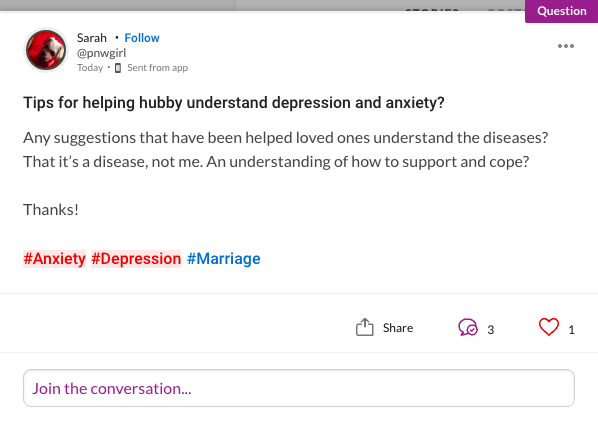“Time. It’s of the essence.”
I’m not entirely sure what that means, but I know I always feel like I don’t have enough of it. I feel stressed and anxious when I wake in the morning because I know what my schedule looks like and the number of things that need to happen between the time I open my eyes and then shut them again (well, I hope I can!). I worry about time, I worry about not having enough of it, and not being able to meet deadlines — mine and my children’s. Then, when I should be sleeping, I’m thinking about how much time certain appointments or tasks will take and when I’ll be able to fit things in.
All three of my kids had the flu this past week and a half. That threw me off entirely. I had to shift my schedule and the time I had allotted to complete certain work or house related tasks was gone… just like that! I’m still trying to catch up, but that’s the story of my life.
Join the conversation by answering the question below:
As an anxious mom and as a mom of a child with disabilities, balancing time and meeting everyone’s needs is overwhelming and sometimes downright impossible. I know I’m not alone. There are many of you out there who are thrilled to have a moment to shower without someone knocking at the door and asking questions from behind the door, or better yet, the small face pressed up against the shower door! And self-care, down time, time to reconnect with my husband? What’s that? Maybe when they’re older, I think.
In an effort to cut down on the running around like I have no idea what I am doing, not being able to keep up with the daily demands, and feeling like I’m just making it each day, I am vowing to make a few changes, and I encourage you to do the same.
1. Learn to say no.
The idea of saying no makes me anxious. It has been from the time I can remember at 5 years old. I didn’t want to upset anyone. I wanted people around me to like me, so I said yes. Yes, yes, yes. Well, that “yes” often means there is no time for me. No time for me to do the things that I like or need to make me less anxious for the next day, next week or next month.
I thoroughly enjoy putting together digital scrapbooks for each year, documenting all the things we have done as a family. I love pictures so this is a nice way for me to keep and treasure all of the snapshots that I am constantly taking. I also love to make jewelry. Nothing too fancy — stringing beads or making earrings. This gives my creative energy an outlet. A place to play and admire my work. I need that. I need that for my mental health so that I’m not just work, work, working all the time.
Well, when I say yes to other things that I could say no to, this is the time that suffers the most for me. So, with that said, I am learning to create a bigger goal and then ask myself if saying yes to something keeps me aligned with that goal. My bigger goal is to create more quiet time where I can let my mind and body unwind. My goal is also to create time for us, as a family, to have the day or a few hours to decompress quietly so that the internal chaos doesn’t persist from day to day. Yesterday, as a family, we all had our quiet time to watch a show, play a game, catch up on work or stuff around the house. By the end of the night, my children seemed more relaxed and settled. They were able to get into their beds and fall asleep with greater ease. I also felt ready for the week.
So the next time that I’m asked if I want to join a “Board of This or That” or take on a task for a PTA related event, there is a very strong chance that my answer will be, “No thanks.”
2. Speak slower; speak lower.
I know that when I’m anxious, I speak quickly and I overwhelm myself, and I especially overwhelm and trigger my daughter. She tells me that I’m saying too much that she can’t understand, and that she can’t do all of these things that I’ve now spoken aloud. I get it, I would overwhelm me, too.
This past weekend, I was in my usual panicked mode when I was hosting my son’s birthday party at a local gymnastics studio. I was moving quickly, speaking quickly, knocking things and children over. If I could have watched me, I think I would have thought, “Wow, she’s a hot mess.”
I didn’t want to feel or look like this anymore, so I experimented (quickly). I decided I was going to move slowly and when someone asked me a question or said something to me, I spoke at a slower pace and at a lower volume. This forced me to slow down my mind, my body, my worries, and actually get to process what was happening in the moment rather than living in my head, as I usually do.
I continued to experiment with my kids over the remainder of the weekend. Each time they asked me a question, I paused first (I never pause!) and then I answered after actually thinking about my response. I also spoke slower and at a lower volume. Their response was somewhat surprising in that they were calmer overall and there wasn’t that sense of urgency that I often hear in their voice. But then again, they may be mimicking the urgency in my voice.
It’s given me a little bit of time to reflect on how often I feel rushed, harried, and how much I convey that in my body language and in my tone to my children and to the people around me. Well, now that I have had this successful experimental experience, my goal is to keep speaking slower and lower!
3. You are in control of your time.
When I think about time, it feels like it’s out of my reach, out of my control. It feels like someone else or something else has a handle on it, but that’s not me. I admire people who can stick to their daily schedule and get to the end of their “stuff” without being bombarded and thrown off by the rest of the “stuff” that each day brings.
The key difference between me and that person that I admire is the fact that when things pop up, they don’t respond right away. I usually stop what I’m doing to tend to that other thing right away, like it’s life or death. But it’s not. That sense of urgency is self-created and to my own detriment. It’s OK if something my children are asking for doesn’t get handled or satisfied right away. Some non-urgent things can wait until I have a moment to do it, like maybe tomorrow or three days from now. Each time I respond immediately, I gain the instant gratification of meeting another person’s needs, but then I begin to feel resentful when my original tasks or goals for the day are thwarted.
Need to share something honest? Downloading our app makes it easy to post Thoughts and Questions on our site.
With that said, I am setting a few target goals for the day and I keep those items prioritized. That is, when another “thing” pops up, I set that at the end of my list, under the items I have deemed important to be completed for the day. Once my items have been checked off, and if I have time for them, then I will conquer those next items. I have found that when I do this, whatever that thing was that needed to get done “right now!” isn’t as urgent. Sometimes, my kids and I realize that we really don’t need to do this (whatever it is) at all. Instead of instantly gratifying my kids, I am delaying the process which is making it easier for my kids to wait and assess if it is a need or a want, and if it is truly that important. Sometimes it still is; sometimes it’s not.
As parents of children with disabilities, we all desire more time. More time to get things done and find time at the end of the day for self-care. Truth is, an extra hour or two won’t make that happen. We make it happen when we make the choice to make it happen.
Getty image by ????? ???????


